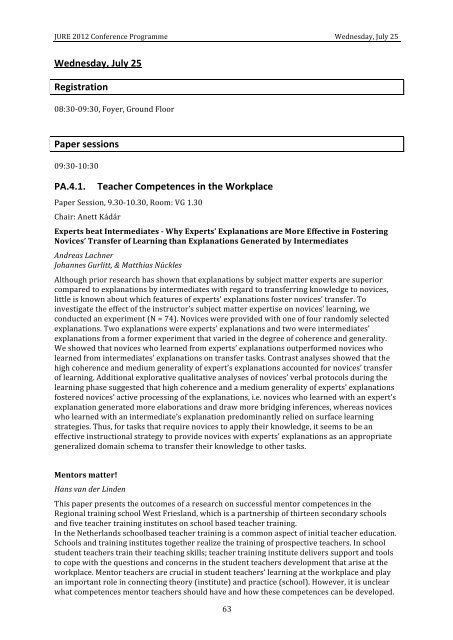JURE 2012 Programme book - EARLI Jure 2012
JURE 2012 Programme book - EARLI Jure 2012
JURE 2012 Programme book - EARLI Jure 2012
You also want an ePaper? Increase the reach of your titles
YUMPU automatically turns print PDFs into web optimized ePapers that Google loves.
<strong>JURE</strong> <strong>2012</strong> Conference <strong>Programme</strong> Wednesday, July 25<br />
Wednesday, July 25<br />
Registration<br />
08:30-‐09:30, Foyer, Ground Floor<br />
Paper sessions<br />
09:30-‐10:30<br />
PA.4.1. Teacher Competences in the Workplace<br />
Paper Session, 9.30-‐10.30, Room: VG 1.30<br />
Chair: Anett Kádár<br />
Experts beat Intermediates -‐ Why Experts’ Explanations are More Effective in Fostering<br />
Novices’ Transfer of Learning than Explanations Generated by Intermediates<br />
Andreas Lachner<br />
Johannes Gurlitt, & Matthias Nückles<br />
Although prior research has shown that explanations by subject matter experts are superior<br />
compared to explanations by intermediates with regard to transferring knowledge to novices,<br />
little is known about which features of experts’ explanations foster novices’ transfer. To<br />
investigate the effect of the instructor’s subject matter expertise on novices’ learning, we<br />
conducted an experiment (N = 74). Novices were provided with one of four randomly selected<br />
explanations. Two explanations were experts’ explanations and two were intermediates’<br />
explanations from a former experiment that varied in the degree of coherence and generality.<br />
We showed that novices who learned from experts’ explanations outperformed novices who<br />
learned from intermediates’ explanations on transfer tasks. Contrast analyses showed that the<br />
high coherence and medium generality of expert’s explanations accounted for novices’ transfer<br />
of learning. Additional explorative qualitative analyses of novices’ verbal protocols during the<br />
learning phase suggested that high coherence and a medium generality of experts’ explanations<br />
fostered novices’ active processing of the explanations, i.e. novices who learned with an expert’s<br />
explanation generated more elaborations and draw more bridging inferences, whereas novices<br />
who learned with an intermediate’s explanation predominantly relied on surface learning<br />
strategies. Thus, for tasks that require novices to apply their knowledge, it seems to be an<br />
effective instructional strategy to provide novices with experts’ explanations as an appropriate<br />
generalized domain schema to transfer their knowledge to other tasks.<br />
Mentors matter!<br />
Hans van der Linden<br />
This paper presents the outcomes of a research on successful mentor competences in the<br />
Regional training school West Friesland, which is a partnership of thirteen secondary schools<br />
and five teacher training institutes on school based teacher training.<br />
In the Netherlands schoolbased teacher training is a common aspect of initial teacher education.<br />
Schools and training institutes together realize the training of prospective teachers. In school<br />
student teachers train their teaching skills; teacher training institute delivers support and tools<br />
to cope with the questions and concerns in the student teachers development that arise at the<br />
workplace. Mentor teachers are crucial in student teachers’ learning at the workplace and play<br />
an important role in connecting theory (institute) and practice (school). However, it is unclear<br />
what competences mentor teachers should have and how these competences can be developed.<br />
63



